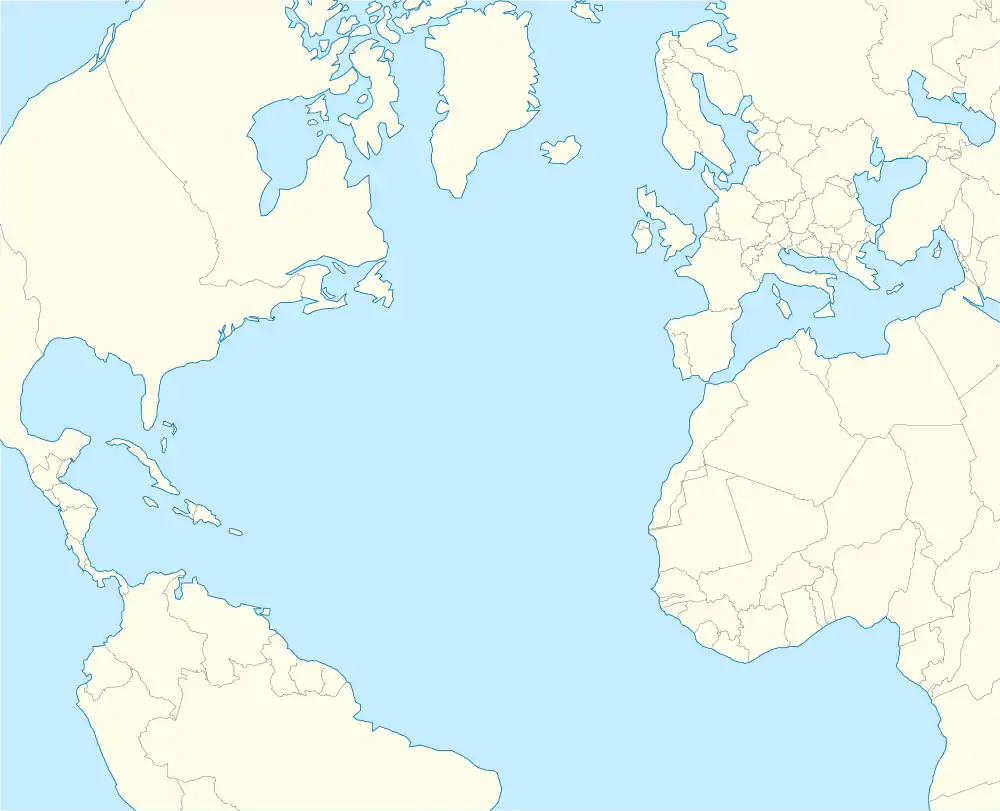SS Empire Breeze
Empire Breeze was a 7,457 GRT cargo ship which was built in 1940 for the Ministry of War Transport (MoWT). Shortly after entering service she ran aground but was repaired. Empire Breeze was torpedoed and sunk by U-176 on 25 August 1942.
| History | |
|---|---|
| Name | Empire Breeze |
| Owner | Ministry of War Transport |
| Operator | J & J Denholm Ltd |
| Port of registry | |
| Builder | J L Thompson & Sons Ltd, Sunderland |
| Yard number | 603 |
| Launched | 3 October 1940 |
| Completed | January 1941 |
| Out of service | 25 August 1942 |
| Identification |
|
| Fate | Torpedoed 25 August 1942 and sank 27 August. One crew member died. |
| General characteristics | |
| Tonnage | |
| Length | 310 ft 6 in (94.64 m) |
| Beam | 59 ft 9 in (18.21 m) |
| Depth | 35 ft (10.67 m) |
| Propulsion | 1 x triple expansion steam engine |
| Crew | 42, plus 6 DEMS gunners |
| Armament | 1 x 4" gun, 1 x 20mm Anti-Aircraft gun, 2 x twin machine guns |

Description
Empire Breeze was built by J L Thompson & Sons Ltd, Sunderland.[1] She was yard number 603.[2] Launched on 3 October 1940, she was completed in January 1941.[1]
Empire Breeze was 310 feet 6 inches (94.64 m) long, with a beam of 59 feet 9 inches (18.21 m) and a depth of 35 feet (10.67 m). She was propelled by a triple expansion steam engine which had cylinders of 25 inches (64 cm), 41 inches (100 cm) and 68 inches (170 cm) bore by 45 inches (110 cm) stroke. The engine was built by George Clarke (1938) Ltd, Sunderland.[3] Empire Breeze was armed with a 4" gun, a 20mm AA gun and two twin machine guns.[4]
Career
Empire Breeze's port of registry was Sunderland. She was operated under the management of J & J Denholm Ltd, Sunderland.[3] On 5 February 1941, she ran aground on the Bondicar Rocks, off Amble, Northumberland. She was refloated on 13 March and taken in tow by the tug Bullger, but the tug struck a mine and sank in Druridge Bay.[5] Empire Breeze was anchored off Cresswell and later taken to Sunderland for repairs. She was a member of a number of convoys during the Second World War.
- ON 37
Convoy ON 37 departed from Liverpool on 15 November 1941 and dispersed at sea on 24 November.[6]
- ON 122
Convoy ON 122 departed from Liverpool on 15 August 1942 and dispersed at sea on 3 September.[7] On 25 August 1942, Empire Breeze was torpedoed by U-176 and U-438. Two torpedoes struck Empire Breeze, killing one crew member. She began to settle by the stern. The captain of U-438 claimed the kill, but postwar analysis shows that it was U-176 which had fired the fatal shot. The tug HMS Frisky was sent from St. John's, Newfoundland and Labrador and Flower-class corvette HMCS Rosthern was detached from the convoy to assist in salvaging Empire Breeze. The surviving crew abandoned ship, but later reboarded her and sent distress signals after repairing the radio set. On 27 August, the Irish merchant ship Irish Willow rescued the 42 surviving crew and six DEMS gunners. They were landed at Dunmore East, County Waterford on 1 September. Although Empire Breeze was still afloat on 27 August, she could not be found by HMS Frisky and the search was abandoned on 30 August.[4] Those lost on Empire Breeze are commemorated at the Tower Hill Memorial, London.[8]
Official Numbers and Code Letters
Official Numbers were a forerunner to IMO Numbers. Empire Breeze had the UK Official Number 168662 and used the Code Letters GPFP.[3]
References
- Mitchell, W H, and Sawyer, L A (1995). The Empire Ships. London, New York, Hamburg, Hong Kong: Lloyd's of London Press Ltd. ISBN 1-85044-275-4.
{{cite book}}: CS1 maint: multiple names: authors list (link) - "1168662". Miramar Ship Index. Retrieved 8 December 2009.
- "LLOYD'S REGISTER, NAVIRES A VAPEUR ET A MOTEURS" (PDF). Plimsoll Ship Data. Retrieved 8 December 2009.
- "Empire Breeze". Uboat. Retrieved 8 December 2009.
- "RNLI Services 1941" (PDF). rnliarchive.blob.core.windows.net. Retrieved 16 March 2020.
- "CONVOY ON (S) 37". Warsailors. Retrieved 8 December 2009.
- "CONVOY ON 122, Code Word MAGOG". Warsailors. Retrieved 8 December 2009.
- "Ship Index A-F". Brian Watson. Archived from the original on 6 October 2011. Retrieved 20 May 2011.